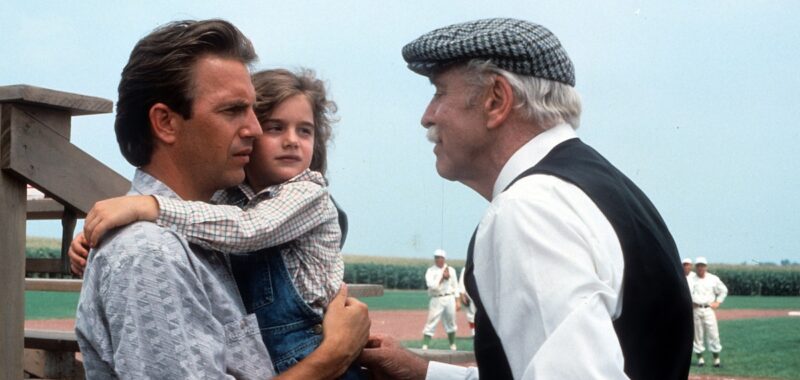If everyone’s schedule allows, Friday nights are movie nights in our house. We’ve watched everything from “Despicable Me” to “Kicking and Screaming” with our two boys. We turn the family room into a sleepover party, complete with sleeping bags, lots of popcorn, and pjs. My children are both sports-obsessed. There isn’t a sports movie they don’t like, truly. My older son in particular loves baseball. So it only seemed natural to me to say, “Hey, let’s watch ‘Field of Dreams.’”
Boy, was I unprepared.
Here’s what I remember of this movie: It’s about a nice guy in Iowa whose daughter is played by Gabby Hoffman, who was in basically every movie I watched a kid. This nice guy decides he wants to build a baseball field in his backyard and then baseball players — who are long-dead — show up to play. It was an innocuous baseball movie to me.
But what I didn’t realize — until this past Friday night, at the tender age of 42 — is that this movie is hardly about baseball at all. No, “Field of Dreams” is about missing your parents when they’re gone, making them proud of you, living the life you imagine, and, sure throw in a side note of book banning in there.
As my kids watched, naming players as they emerged from the corn field, you can imagine my surprise when it became clear to me that this movie is actually really, really heavy. As a kid, I definitely didn’t realize all the financial issues the Kinsellas had; I certainly didn’t understand that Kevin Costner’s character basically kidnaps Terence Mann (aka the late, great, James Earl Jones) in his quest for answers.
Sure, I vividly remember the scene when Gabby Hoffman chokes on the hot dog and the doctor — played by Burt Lancaster (seriously, I NEVER knew that Burt Lancaster was in this movie!) — saves her, thus ending his own dream of playing ball. When I was younger, I remember thinking, oh, look, the sweet old doctor left the ball field by taking this weird, big step to save the kid. What I certainly didn’t understand was what sacrifice and self-giving was like until I had my own children many years later.
When you’re young, you can’t (hopefully) begin to understand sacrifice and the sheer all-compassing love your parents have for you, and how in turn you will have that for your children. But in watching that scene now, it hits different. Now I know about the consequence of choices we all make. I have no regrets having children — I’m just saying I’ve seen more of life. When the doctor steps into present day, away from the dreamland of the baseball diamond, he’s choosing compassion, and being helpful, and doing what he trained to do long after baseball was over for him. He gave up his second chance at a dream to save a child. Sometimes, you have to opt for the choice — or maybe you just do it by second nature — that is less convenient but necessary.
As the movie ends, and Kevin Costner sees his long-dead father — thus realizing who the “he” is in “if you build it, he will come” — I completely lost it. The elder Kinsella, played by Dwier Brown, yet another 90s fixture, is there on the field, young and fit and taking off his catcher’s gear — not like the man who died estranged from his son years earlier. The scene is famous for many reasons (not least of which is that it’s the ending of the movie). But more importantly it’s famous for encapsulating how you deal with regret, and things left unsaid — or things you wish you could take back. It’s about growing up; it’s about the special relationship between fathers and sons.
I’m at the age where — thankfully — my parents are still alive, but they’re aging. Watching your parents age, though it’s a privilege not everyone is afforded, is hard. It forces you to think about what happens next, what you want to say to them and what you want to ask them. It makes you dwell on how you’ve spent so much of your life trying to make your parents proud, from your youngest moments to the most recent days. And as a parent now, it makes me wonder what my relationship with my kids will be like as they age; will I make them proud as their mom?
As the camera panned upwards towards the sky — real heaven, get it?! — my boys clapped as they do when any movie ends as if they were still 4 years old. While I wiped the tears from eyes, amazed at the depth of a movie I had for years deemed a just another sports film, I asked my kids if they liked it.
“Yea, it was good. I mean, it had Shoeless Joe Jackson in it,” my older son said.
And so another generation gets duped.

